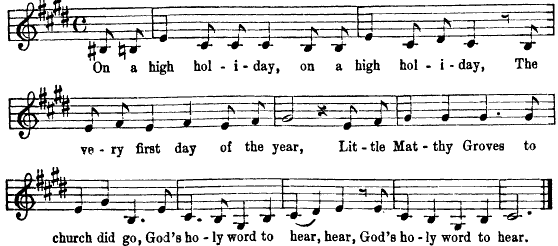Little Matthy Groves- Case (MO) pre1916 Belden; Kittredge IV
[From: Ballads and Songs by G. L. Kittredge; The Journal of American Folklore, Vol. 30, No. 117 (Jul. - Sep., 1917), pp. 283-369. His notes follow. Also in British Ballads from Maine (for comparison) and Belden's 1940 Ballads and Songs.
R. Matteson 2012, 2015]
LITTLE MUSGRAVE AND LADY BARNARD (Child, No. 81).
This famous ballad, one of the finest that exist, is well preserved in America. This Journal has printed a version from Nova Scotia, collected by Professor W. R. Mackenzie of Washington University, St. Louis (23 :371-374; 25 : 182-183: "Little Matha Grove"). Texts are reported from Kentucky by Shearin and Coombs (p. 8, "Lord Vanner's [or Lord Daniel's] Wife "),[1] from Virginia by Professor C. Alphonso Smith (Bulletin, No. 3, p. 4), from North Carolina by Professor F. C. Brown (p. 9, cf. JAFL 28 :201), from South Carolina by Professor Reed Smith (JAFL 28 : 201), and a fragment from West Virginia by Professor J. H. Cox (46 : 22, 64).
IV. Little Matthy Groves
The following excellent copy, with the melody, was sent to Professor Belden in 1916 by Mrs. Eva Warner Case, as written down from memory, with the assistance of her mother and grandmother. It comes from Harrison County, Missouri.[1]

1. On a high holiday, on a high holiday,
The very first day of the year,
Little Matthy Groves to church did go
God's holy word to hear, hear,
God's holy word to hear.
2. The first that came in was a gay ladie,
And the next that came in was a girl,
And the next that came in was Lord Arnold's wife,
The fairest of them all.
3. He stepped right up unto this one,
And she made him this reply,
Saying, "You must go home with me to-night,
All night with me for to lie."
4. "I cannot go with you to-night,
I cannot go for my life;
For I know by the rings that are on your fingers
You are Lord Arnold's wife."
5. "And if I am Lord Arnold's wife,
I know that Lord Arnold's gone away;
He's gone away to old England
To see King Henery."
6. A little footpage was standing by,
And he took to his feet and run;
He run till he came to the water-side,
And he bent his breast and swum.
7- "What news, what news, my little footpage?
What news have you for me?
Are my castle walls all toren down,
Or are my castles three?"
8. "Your castle walls are not toren down,
Nor are your towers three;
But little Matthy Groves is in your house,
In bed with your gay ladie."
9. He took his merry men by the hand
And placed them all in a row,
And he bade them not one word for to speak
And not one horn for to blow.
10. There was one man among them all
Who owed little Matthy some good will,
And he put his bugle horn to his mouth
And he blew both loud and shrill.
11. "Hark, hark! hark, hark!" said little Matthy Groves,
"I hear the bugle blow,
And every note it seems to say,
'Arise, arise, and go!' "
12. "Lie down, lie down, little Matthy Groves,
And keep my back from the cold!
It is my father's shepherd boys
A-blowing up the sheep from the fold."
13. From that they fell to hugging and kissing,
And from that they fell to sleep;
And next morn when they woke at the break of the day,
Lord Arnold stood at their feet.
14. "And it's how do you like my fine feather-bed,
And it's how do you like my sheets?
And it's how do you like my gay ladie,
That lies in your arms and sleeps?"
15. "Very well do I like your fine feather-beds,
Very well do I like your sheets;
But much better do I like your gay ladie,
That lies in my arms and sleeps."
16. "Now get you up, little Matthy Groves,
And all your clothes put on;
For it never shall be said in old England
That I slew a naked man."
17. "I will get up," said little Matthy Groves,
"And fight you for my life,
Though you've two bright swords hanging by your side,
And me not a pocket-knife!"
18. "If I've two bright swords by my side,
They cost me deep in purse;
And you shall have the better of the two,
And I will keep the worse."
19. The very first lick that little Matthy struck,
He wounded Lord Arnold sore;
But the very first lick that Lord Arnold struck,
Little Matthy struck no more.
20. He took his ladie by the hand
And he downed her on his knee,
Saying, "Which do you like the best, my dear,
Little Matthy Groves or me?"
21. "Very well do I like your rosy cheeks,
Very well do I like your dimpled chin;
But better I like little Matthy Groves
Than you and all your kin."
22. He took his ladie by the hand
And led her o'er the plain;
He took the broad sword from his side
And he split her head in twain.
23. "Hark, hark, hark, doth the nightingale sing,
And the sparrows they do cry!
To-day I've killed two true lovers,
And to-morrow I must die."
1 See p. 322, below.
[From p. 322:] A text from Missouri (with the tune) is communicated by Professor Belden as sent to him by Mrs. Eva Warner Case. Mrs. Case gives the song from memory, "with the assistance of her mother and grandmother." "It was commonly sung," she writes, "in Harrison County, Missouri, as late as 1890. The settlers here were of Virginia and Kentucky stock, with a sprinkling of Tennesseeans, and many of the songs had been in the family at the time of their coming from England."